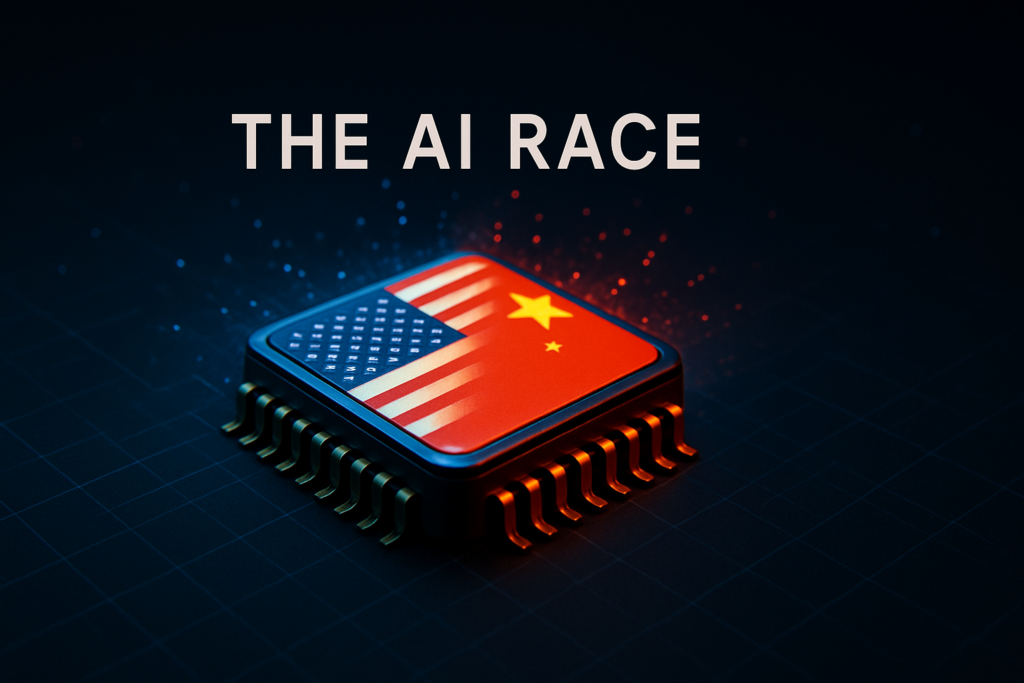
In a revealing Capitol Hill visit, NVIDIA CEO Jensen Huang delivered a sobering assessment of the global artificial intelligence landscape: China isn’t lagging behind in AI development — they’re right on our heels.
The Global AI Competition: Closer Than You Think
During his visit to lawmakers, Huang addressed the common misconception that the United States maintains a comfortable lead in artificial intelligence development. When asked directly about China’s position in the global AI race, his response was unequivocal:
“China is not behind anybody. China is right behind us. I mean, we’re very, very close.”
This statement carries significant weight coming from the leader of NVIDIA, the company whose chips power much of today’s AI revolution. Huang’s assessment contradicts the more optimistic narratives we often hear about American technological supremacy.
An Infinite Race With No Finish Line
Huang characterized the competition with China not as a sprint but as an “infinite race” with no clear endpoint. Unlike sports competitions or quarterly business targets, technological advancement has no final buzzer or closing bell.
“In the world of life, there’s no two-minute end of the quarter. There’s no such thing. And so we’re going to compete for a long time,” Huang explained.
This framing helps us understand why maintaining even a slight edge requires continuous investment and policy support. The race doesn’t end — it only intensifies.
China’s Formidable AI Capabilities
What makes China such a formidable competitor? According to Huang, several factors contribute to their strength in AI development:
- Technical Expertise: Huang specifically highlighted that “50% of the world’s AI researchers are Chinese,” representing an enormous talent pool.
- Economic Resources: China possesses “great wealth” to fund ambitious AI initiatives.
- Corporate Champions: Huang acknowledged Huawei as “one of the most formidable technology companies in the world,” praising their capabilities in computing, networking technology, and software — all essential components for AI advancement.
The NVIDIA CEO noted that Huawei has made “enormous progress” in recent years, developing capabilities across all domains needed to advance artificial intelligence systems.
Manufacturing and Policy Considerations
During his Capitol Hill visit, Huang also addressed questions about manufacturing and tariffs, expressing support for policies that enable onshoring of manufacturing while maintaining global competitiveness.
“There should always be policy that enables, supports, and accelerates the ability for us to onshore manufacturing,” Huang stated. “But with willpower and with the resources of our country, I’m certain we can manufacture onshore.”
This balanced perspective acknowledges both the importance of domestic manufacturing capabilities and the reality that restrictive trade policies could potentially hamper America’s competitive position if not carefully designed.
A Complex Ecosystem Beyond Hardware
As Emily Wilkins reported from the event, Huang emphasized that AI leadership depends on more than just hardware development. Success requires a comprehensive ecosystem that includes:
- Skills development
- Energy infrastructure
- Supportive trade policies
- Manufacturing capabilities
This holistic view suggests that maintaining America’s competitive edge requires coordinated policy across multiple domains — not just in chip design or production, but across the entire technology infrastructure.
Policy Implications for American Leadership
Huang’s insights arrive at a critical juncture for American technology policy. The Trump administration is currently formulating its approach to AI development, having reversed many of the policies put forward by the previous administration.
Industry experts have expressed concern about policy uncertainty, noting that clear national direction is essential for the U.S. to “have a seat at the table” in establishing global AI standards and norms.
The Competitive Balance
For companies like NVIDIA, which operate globally while being headquartered in the United States, navigating this complex landscape presents unique challenges. While NVIDIA benefits from American leadership in technology, China remains an important market — creating tensions when export restrictions are implemented.
Previous chip bans resulted in significant financial impacts for NVIDIA, highlighting the delicate balance between national security concerns and commercial interests in the global technology marketplace.
The Long Game of AI Development
What emerges from Huang’s comments is a view of AI development as a marathon requiring sustained national commitment. While America maintains a slight lead today, the competition is fierce and dynamic.
The ultimate winners will likely be determined not by short-term advantages but by which nations create the most conducive environments for continuous innovation over decades.
As Huang reminded lawmakers, this isn’t a race with a finish line — it’s an ongoing competition that will shape technological development for generations to come.
Stakes Couldn’t Be Higher
Jensen Huang’s frank assessment serves as both a reality check and a call to action. The United States cannot take its leadership position for granted, nor can it afford policy missteps that might cede advantage to determined competitors.
With AI poised to transform virtually every industry and aspect of modern life, the stakes of this “infinite race” couldn’t be higher. The countries that lead in artificial intelligence development will likely enjoy outsized influence in shaping the global economy of the 21st century.
Huang’s message is clear: America’s position is strong but precarious, and maintaining technological leadership will require thoughtful policies that balance security concerns with the imperatives of innovation in an increasingly competitive global landscape.
